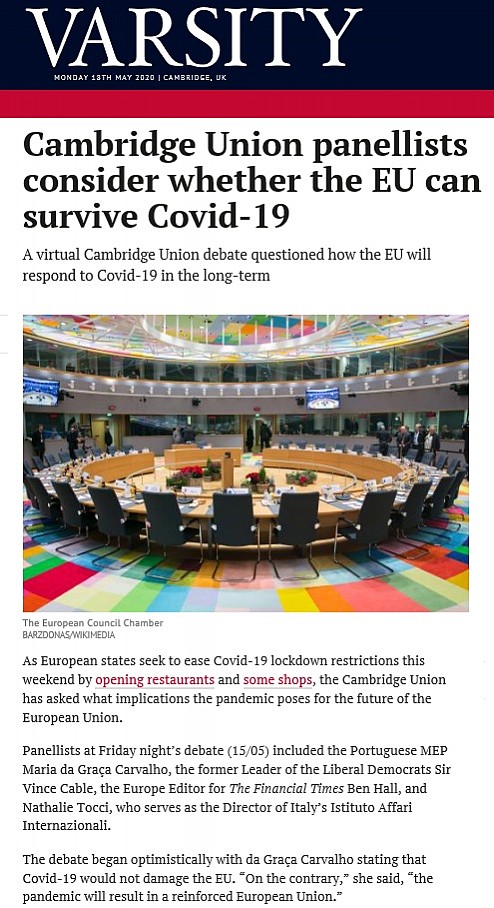Press Cambridge Union panellists consider whether the EU can survive Covid-19
A virtual Cambridge Union debate questioned how the EU will respond to Covid-19 in the long-term
As European states seek to ease Covid-19 lockdown restrictions this weekend by opening restaurants and some shops, the Cambridge Union has asked what implications the pandemic poses for the future of the European Union.
Panellists at Friday night’s debate (15/05) included the Portuguese MEP Maria da Graça Carvalho, the former Leader of the Liberal Democrats Sir Vince Cable, the Europe Editor for The Financial Times Ben Hall, and Nathalie Tocci, who serves as the Director of Italy’s Istituto Affari Internazionali.
The debate began optimistically with da Graça Carvalho stating that Covid-19 would not damage the EU. “On the contrary,” she said, “the pandemic will result in a reinforced European Union.”
Whilst commentators have argued that the pandemic has revealed a lack of solidarity in the EU, da Graça Carvalho pointed to the way in which Covid-19 has prompted a shift from national towards European wide health policies. For example, the EU initiated a voluntary Joint Procurement Agreement with Member States (and the United Kingdom and Norway) which enables the joint purchase of equipment and supplies to tackle the coronavirus.
Other panellists were more cautious. Sir Cable argued that the measures implemented by European governments to tackle Covid-19 – notably, restrictions to movement and trade – were rendering the fundamental freedoms of the EU “meaningless”.
“The common market is breaking down”, he claimed.
Hall then remarked that the EU’s biggest achievement during the pandemic is that it had been “undoing itself” by “suspending fiscal rules, restrictions on state aid and the freedom movement”. “The question is how quickly these will be restored,” he asked.
In the final address, Tocci stated that Covid-19 had sharpened wider trends of deglobalisation where EU countries have increasingly favoured protectionism and economic nationalism in the aftermath of the 2009 Eurozone Crisis.
Tocci proposed that Covid-19 has been a “trend accelerator” in that “the crisis has heightened the vulnerability of global supply chains and the need for critical supplies within national borders.”
This was counterbalanced with her suggestion that Covid-19 could “resurrect the role of competency and expertise” which has been “public enemy number one” for many populist and nationalist political parties across the continent. “Optimism and pessimism co-exist”, concluded Tocci.
While the pandemic has highlighted the need for greater intra-European cooperation, panellists questioned the scale at which Covid-19 could be appropriately addressed by European governments. Da Graça Carvalho suggested that “there is no national response to a global problem.”
Panellists emphasised that significant challenges for the EU remain other than Covid-19.
The pandemic has masked wider problems of climate change, Brexit and Hungary’s authoritarian turn under Viktor Orbán, who has enforced sweeping new powers in an effort to stem Covid-19.
Sir Cable remarked, “if the European Union does not stand up for basic democratic principles, lots of Europeans would cease to believe it in”.
